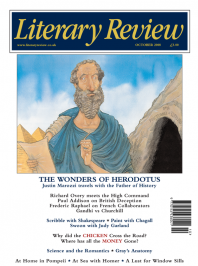Katherine Duncan-Jones
As You Like Him
Soul of the Age: The Life, Mind and World of William Shakespeare
By Jonathan Bate
Viking 512pp £25
Jonathan Bate has a true novelist’s gift for scene setting and story telling. He spots interesting details and connections overlooked by previous writers, allowing his lively imagination to play freely around them. This lends freshness and charm to many passages in his latest book, especially its opening sections, such as ‘The Discovery of England’. These also pleased me, I confess, because of occasional similarities to the opening chapter of my own Ungentle Shakespeare (2001). But Bate fashions many delightful and original vignettes of his own, such as a scene in which Lord Burghley sits in his Whitehall office with Saxton’s ‘newly minted’ map of England and Wales hanging on the wall. He also suggests cogently that Shakespeare’s status as ‘a provincial outsider’ contributed to a keen fascination with more extreme outsiders such as Shylock and Othello, and notices Shakespeare’s avoidance of London-based comedy in favour of a single farce located ‘in bourgeois small-town Windsor, a place far more like Stratford’.
Even in the opening sections, however, Bate’s affable fluency can carry him away. Like many readers of Venus and Adonis, he discerns the memories of ‘a country boy’ in the poet’s evocation of ‘poor Wat’, a hunted hare which darts to and fro in desperate terror. But his conclusion that

Sign Up to our newsletter
Receive free articles, highlights from the archive, news, details of prizes, and much more.@Lit_Review
Follow Literary Review on Twitter
Twitter Feed
Under its longest-serving editor, Graydon Carter, Vanity Fair was that rare thing – a New York society magazine that published serious journalism.
@PeterPeteryork looks at what Carter got right.
Peter York - Deluxe Editions
Peter York: Deluxe Editions - When the Going Was Good: An Editor’s Adventures During the Last Golden Age of Magazines by Graydon Carter
literaryreview.co.uk
Henry James returned to America in 1904 with three objectives: to see his brother William, to deliver a series of lectures on Balzac, and to gather material for a pair of books about modern America.
Peter Rose follows James out west.
Peter Rose - The Restless Analyst
Peter Rose: The Restless Analyst - Henry James Comes Home: Rediscovering America in the Gilded Age by Peter Brooks...
literaryreview.co.uk
Vladimir Putin served his apprenticeship in the KGB toward the end of the Cold War, a period during which Western societies were infiltrated by so-called 'illegals'.
Piers Brendon examines how the culture of Soviet spycraft shaped his thinking.
Piers Brendon - Tinker, Tailor, Sleeper, Troll
Piers Brendon: Tinker, Tailor, Sleeper, Troll - The Illegals: Russia’s Most Audacious Spies and the Plot to Infiltrate the West by Shaun Walker
literaryreview.co.uk